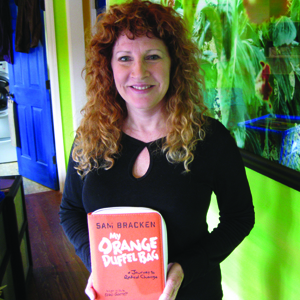 While working on a brochure for Mohawk Industries, Echo Garrett heard many stories about the company’s then-vice president of marketing, Sam Bracken. Moved by his life story, she eventually co-authored a book with him, titled “My Orange Duffel Bag: A Journal to Radical Change,” chronicling his journey from homelessness in Las Vegas to football stardom at Georgia Tech.
While working on a brochure for Mohawk Industries, Echo Garrett heard many stories about the company’s then-vice president of marketing, Sam Bracken. Moved by his life story, she eventually co-authored a book with him, titled “My Orange Duffel Bag: A Journal to Radical Change,” chronicling his journey from homelessness in Las Vegas to football stardom at Georgia Tech.
Both Garrett and Bracken share an interest in helping foster care youth. The nation’s foster care system serves more than 400,000 young people — a quarter of them ages 14 to 17 — with approximately 20,000 individuals turning 18 and becoming legally emancipated from foster services every year. Atlanta-based advocacy group EmpowerMEnt indicates that nearly half of teens leaving foster care at 18 lack high school diplomas. Prior to emancipation, 40 percent have become teenage parents, while a quarter have already experienced homelessness.
“We just didn’t want to write a book,” Bracken said. “We wanted to change the face of at-risk kids, especially teenagers who are aging out of foster care, or kids that have been involved in juvenile justice and struggling.”
Elixir for kids leaving foster care
Together, Garrett and Bracken founded the Orange Duffel Bag Foundation, which received nonprofit designation in 2010. In the three years since, the organization has graduated more than 300 students from its after-school program and served more than 2,000 teens through both official and “sample” coaching classes.
“As we looked at different programs, we didn’t see anything out there that was exactly what we had in mind of doing,” Garrett said. “What we wanted to do was bring executive level coaching to kids and also surround them with a supportive group of adults.”
The Orange Duffel Bag Foundation (ODBF) provides a 12-week coaching program for both young people in foster care and other youth at risk for homelessness in the metro Atlanta area. Older teens, usually 14- to 19-year-olds, meet for two-and-a-half-hour weekly classes. The coaching sessions are largely based on principles derived from Bracken and Garrett’s book, which seek to promote an awareness and understanding of where the young people are, as well as help youth identify their talents and desires so they can better establish long-term life goals.
“They get a lot of things out of our class,” Garrett said. “They get leadership skills, they get character skills and they get practical information about designing life plans.”
Garrett now works as the Global Director of Media Publishing at FranklinCovey Co., and Bracken is also a motivational speaker who has been profiled on media outlets like CNN and The Huffington Post.
Providing tools teens need
Without access to cell phones or the Internet, Garrett believes young people are very unlikely to excel in school or find employment. “With a lot of the young people we work with, they are in poverty or coming out of poverty, and very few of them have good access to technology,” Garrett said. For that reason, she said, every young person enrolled in the classes receives a laptop computer upon graduating from the program.
The program isn’t just a “one-and-done” operation, stated Garrett. Long after young people graduate from the after-school program, she said the ODBF is willing to continue providing assistance. “We try to help them overcome barriers we know they are going to hit,” she said.
Currently, the ODBF offers programs via partnerships with various universities and technical colleges. The organization offers classes in Georgia and Utah, with aspirations of branching out into Alabama, Florida, Louisiana and Mississippi — all states, Garrett believes, that are in dire need of foster-care reform.
A nonprofit’s journey
The Foundation’s formative years were tough: “Both Echo and I had to write checks ourselves,” Bracken said.
“We started a nonprofit at, actually, the worst time you could start one, in 2008, right after the huge recession hit,” he said. “Nonprofit, philanthropic ventures were really hit hard, [but] it seems to be doing well because we have a clear vision and a lot of support.”
Since 2011, the ODBF expanded from just one class to six, plus a tentative pilot program in Alabama in 2013. The number of volunteers the organization uses has doubled during the same timeframe, with the number of life coaches tripling during the last two years.
Bracken said some of the earliest donors he reached out to were fellow Georgia Tech alumni who contributed to their cause. The organization soon transitioned from personal funding to government grants, but Bracken is quick to note the importance of those early donations to organization’s success. “Without personal funding getting us going,” he said, “we never would’ve done it.”
After partnering with the University of Georgia’s Fanning Institute, as well as Clark Atlanta University and EmpowerMEnt, Garrett said ODBF was able to secure Temporary Assistance for Needy Families (TANF) funding via federal government streams flowing through Georgia. The organization, she said, recently renewed a grant to fund their after-school programming.
Graduating to help
“Most recently, the Board of Regents is very interested in our work, because right now, only 2 percent of kids coming out of foster care nationally go on to higher education,” she said. To help improve college retention rates, the Board granted the ODBF partial funding to operate three classes this year.
“Our model is to go into the communities we are serving and work closely with the business community to help raise awareness,” Garrett continued. “So we look for a mix of government, private and corporate funding.”
The ODBF received its first corporate donation from the Xerox Foundation. “What we found is that when we get in front of the decision-makers and the business leaders in a community, and explain what we do and why, they get on board pretty quickly,” she stated. “Once people catch the vision, we are getting the funding.”
Bracken said that a compelling story is crucial in attracting funders. “We didn’t beg, we did what we needed to do to help the kids, and maybe we proved our process and proved what we’re doing worked before we really asked for money.”
Roughly 3 percent of the young people ODBF targets attend college, and of them, only 3 percent graduate, Bracken said. Comparatively, about 40 percent of the young people enrolled in ODBF classes attend college, and their graduation rates are “far more than the national average” according to Bracken.
“I think a lot initial of NGOs don’t have…this data-driven approach,” said Bracken. “They have a good idea, they’re well-intended, but people want proof.”
After two years of hard work and personal sacrifice, Bracken said that his organization has really made an impact on local foster-care youth. “Now, because we have the proof,” he said, “it becomes easier to ask for money because we know that we have data that says we’re changing the lives of these kids.”






























